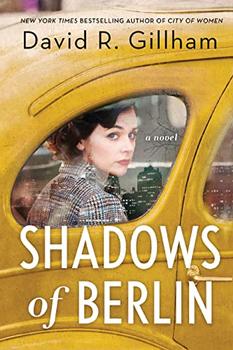Summary | Excerpt | Reading Guide | Discuss | Reviews | Beyond the Book | Readalikes | Genres & Themes | Author Bio

A Novel
by David R. Gillham
"Stop it," she hears herself snap. "Stop it." A terror has gripped her, seized her by the bones. She feels like she might suddenly suffocate under his weight. Like her heart might stop. "Aaron!" she pleads, frantically now, and this time, he's had enough. He quits, disconnects, and rolls onto his back.
For a moment, they simply breathe roughly into the darkness hanging above them. Rachel feels the tears heating her eyes. Is it really so much to ask? A child for her husband? He never made any secret of the fact that he wanted a baby. "I'm sorry," she breathes, smearing at her tears. "I'm sorry," she repeats, but it makes no difference. Her husband has become a solitary island beside her.
"No, it's okay. I get it." He sighs. "Not angry. Forget it," he tells her thickly. Issuing a quick peck on the cheek, he rolls over, turns his back on her, shifting the bedclothes to his side. Leaving her to the darkness. Alone in her body, her guilt is insistent: What right does a murderess have to create life? Blanketed by the night, only a small halo of yellow from the night-light keeps her from going under.
As far as talent is concerned, she must make do with what she has been able to scavenge. Her mother always encouraged her. Rachel was the daughter of Lavinia Morgenstern-Landau, Portraitist of the Great and Near-Great. One of only two women to be elected to the Prussian Academy of the Arts! The founder of the Berolina Circle! Of course the daughter must show talent.
But only up to a point. She could never be so skilled that she mounted a challenge to her eema's hegemony as the supreme painter of the family. Her father, she had learned, had gathered his laurels as a poet, which had been sanctioned because poems were only words, and words were no competition in Eema's mind. And Abba was dead by the time Rashka was a toddler, so she was not old enough to retain memories of him. He survived the war, survived the influenza, but then was devoured by consumption in 1928 when Rashka was only two. Her single memory of her father is shaped by the portrait that hung in the salon. Eema had painted him in shadows not long before his death, a gaunt, handsomely distant face, half in the dark, already partially consumed by the disease that would claim him.
As she grew, people commented on how Rashka had his eyes. Sometimes his nose. Also, they said, his stubbornness and his silence. These ghost features, these traits that she has inherited from a dead father, were always like the spirit of a dybbuk possessing her but in a quietly paternal way. Eyes, nose, stubbornness. Silence. These are her abba's lone bequests to her. All else is Eema. Rashka was permitted to shine as a reflection of her mother's genius. This single fact defined Rashka's development as an artist. Even now, years after her mother's demise, it is there, sewn into Rachel's heart as she scrutinizes her reflection distorted by the aluminum face of the Proctor electric toaster.
Days have passed since their aborted attempt at marital intercourse. The air is growing chilly. The radiator hisses with heat. She is dressed in one of Aaron's old knit sweaters pulled over her pink chenille bathrobe and with wool socks on her feet, because she is always cold. One of her husband's Lucky Strikes smolders in the green glass ashtray on the kitchen table as she sketches her reflection on a pad with a charcoal stick. Her mother shares the table, smoking a rice-paper Gitanes Brune inserted into an elegant amber resin holder. A strong and pungent aroma in the past, but all that Rachel smells is the stink of ash that always lingers over her mother's arrival. Eema's face is a perfect heart shape and her complexion alabaster. She is dressed in her finery of velvet and sable. Her black bob is silvered by the arrow point of a widow's peak. Her face is coldly beautiful. Not exactly the nurturing parent, perhaps. Always happy to judge.
Excerpted from Shadows of Berlin by David R. Gillham. Copyright © 2022 by David R. Gillham. Excerpted by permission of Sourcebooks. All rights reserved. No part of this excerpt may be reproduced or reprinted without permission in writing from the publisher.
The only real blind person at Christmas-time is he who has not Christmas in his heart.
Click Here to find out who said this, as well as discovering other famous literary quotes!
Your guide toexceptional books
BookBrowse seeks out and recommends the best in contemporary fiction and nonfiction—books that not only engage and entertain but also deepen our understanding of ourselves and the world around us.